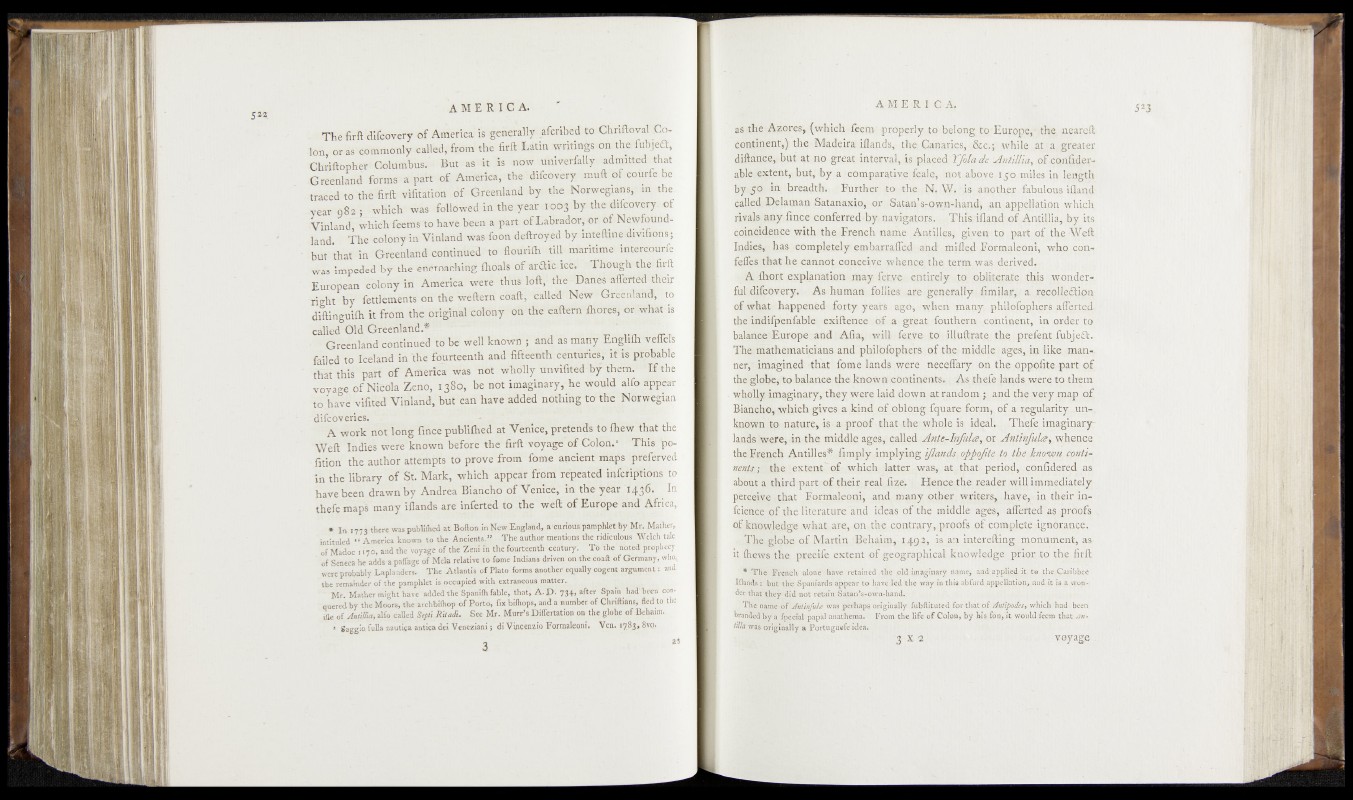
&£j A M E R I C A . 5a‘a-
T h ’e-firft diifcovery of America: ijsigetieraMy -afcribed'fo*G%iftav.ailf^otofer
o r ^ coMm6tily*ealled*rirom th e H i iwriting^oh.thet futfca»
©IMtepher-: Columbus. - B u t-w U t 1 mow
Greenland fo rm s-a p a rt» e f America,* tk^dife© very ,muft of/cotoie be
traced to the-firft vifitatkm Ip f Greenland b y .th e Norwegians*-kf*the
-y e a r 082 ; w hich' was -followed in the y e a r - g | | | by the M S H P
Vinland, w h ich fe em rto have been a part of'Lafedete, Neyfonndland.
T h e colony in V inland was fo©n*deftroyed byd'atjeftine d i^ f e n s ;
• but“ that in Greenland centinifed to flourifti
was impeded bjRhejerteroaching fhoals of aT& fcie ^ T h ^ u g frth ^ firft
' European cbloriy in America were thus' ldft? the - D a n eV a « e d - !h e ir
Tight by fettlements on the weftern coaft, ’called
diftinguilh it from the original colony ori tKe e a f t e m - l h d r a H r f ^ k P
called Gld Greenland.* , • „
• d fe e n la n d continued to be well known ; and as many Englil h ^ l f e ls
failed .tp Iceland in 'th e th irte e n th and ffie e n th ceritMesf it^ s .^ 'M b l s
' that this part o f America was deft wholly unvifited-'by* th eM ^ l f 'th e
voyage o f Nicola Zeno, 1380, be not imaginary,-he would a l |M § a r
to i M vifited Vinland, but can have added W h i n g f e 1 the Norwegian
dilcoveries. -
A work not] long fince publilhed at Venice, p re te n d to fliew t h |f the
Weft Indies were'known before' th e fifft Voyage o f G r if f i.1' '^H is 'por
tio n the author attempts to prove from'fbrite ancient maps pfeferved
in the library o f St. Mark, which appear from repeated inferipfipns "to
have been drawn by Andrea Biarichp o f Venice, In th e y k r 14*36. In
- thefe maps many lflands are inferted to the weft o f Europe arid Affila,
* In 1773 there was publilhed at Bofton. in New England, a'curioua pamphlet by Mr. Mather,,
intituled “ America known to the Ancients.” The author mentions the ridiculous Welch tale
of Madoc 1.70, and the voyage of the Zeni in the fourteenth- century. To the noted prophecy
' of Seneca he adds a paffage of Mela relative to feme Indians driven on the coaft of Germany, who,
were probably Laplanders. The Atlantis of Plato forms another equally cogent argument: and
the remainder of the pamphlet is occupied with extraneous matter. .
- Mr. Mather might have added the Spanilh fable, that,. A. XT. 734, after Spain had’been con*
quered by the Moors, the archbilhop of Porto, fix bilhops, and a number of Chriflians, fled to the
ifle of Antillia, alfo called Septi Ritacli. See Mr.. Murr’s Differtation on the glob.e of-Behaim.;
* Saggiafulla nautica antica dei Yeneziani; di Viucenzio Pormaleoni. Ven. >783,. 8vq,
I , | |
as the Azores, (which feem properly to belong to Europe,- the, neareft-
continent,) the Madeira iflands, the Canaries, &cv; while at a4greater
di#atje.e,i great 'int§rvalj/|^plgse-dfi|^A^^^/^fe, ,of con^Lderablefg^.
ent,- but|fby:h’£Gpmp^ not-ar a k ^ i 50-rnilfca in length
b ^ 5 # Ari Ve.adth. FjUj$>hej:’ >to ^thjP N. W f ig^p-other fabulous ifland
s^Delama^jfafana'xio;)>0r,rSa.tanfSp,own-hand*, gruappellation which
riv^l8|^ay Appel cginferredThy navigatiors. Thfsrifland of Antillia, by its
q»^'dpuce with.th^^ |n^h name given to part,.of, the -Weft
In^i,e§£..has completely emba^afl^ and' mifljsjl Jormaleoni, who con-
feffesfthat.he cannotfjq o n fe ^ whence t-h^.^erpXjW^^deriy£d.;.,
A fhort expfanritiori jnay ief.v^.entirely * t^e^tejrate tl^is *wonder-
Mdifcovery. As human fo||^s'-..are'generally-,fimilar, a,^recollection
of what happened forty yeaf^ago*hen- many philoipphprs^jllrtetU
thg indifpenfahle extftepce .of a great fouthey,%#!eptment, in order to
bakrie^EuropCsarid 'Alia* wi'Uv f s c M s l i i n t h e } ipre(ent.*||tljje£t.r
Thetmathematicians and phjlbfOiphejjS;pf thpj -mid^|piag^un like man-r
iH^ftiagined'-that: fome lands were,tiecSffaqftfoja
thpigfsgljefto balance the know^icbntjnents-.i^j'^LS £he^lands(,w,ere to them
w.holj^imagiharyj'they were laid "down.-at r ^ n d o d t^riAv-pay(map ,ofr
Biartdho^ which giyes«(a- kind of ablgflg.-fquiare fo-rTmT- of»a(^giritriitiiiSnn-.
kn^?sn ;tp. sriature, isva, proof thats^gn^jpilet ideal. M,Thefe imaginary:
lands fw?-re, -in the middle ages, called Ante-lnfulcerpx. Antinfula^ wh.ence.'
th^Eietkch Anrilles#..»fim!ply implying ijlands oppofite to the known t&fHsi
nents^ xbe/iextent^of- ^lii^.ilatter^was^ att that’^period,?} coniider^d ,ast
ahoiita thirdpart of their rea^ge^.^,I|en«!ehtl^ejjEeadeEtwiEimmediately
pere'e^e rtjiat Formaleo-ni', ancl, many, .pt,h,er. writers^, haye,p>ms th.eir in^*
feience of the. literature and ideas of the middle ages, afferted as proofs;
of knowledge what are, on the contrary, jp;ropfs „qf« tqimplet e ^.gnoran^e, •
J h s , glqhe p f l\|;artin ’Behaim, 1 4 9 2 , i s ! a|i j ijt ere ( r in g ,.m o p;U g i e n t , asr
it {hews the precife extent of geographical knowledge prior to the fir ft
* The French» alone'have retained the old imaginaryrlija&ie; and' applied it t© the Car,ibbee.
Iflanda::': but the Spaniards appear to have led the way in this abfui-d appellation, and ijf ‘is«a «yonder
that they did not retain. Satanfs-ownJband.
The name of Wnlinfttltc; was perhaps originally” fubflituted for that of Antipodes, whieli had been
branded- by a Epecial papal anathema. From the life of Colon, by his fdn, it would feem that jin \ ,
iilla was originally a Portuguefe idea.
3 x.2 voyage